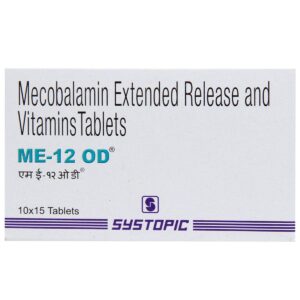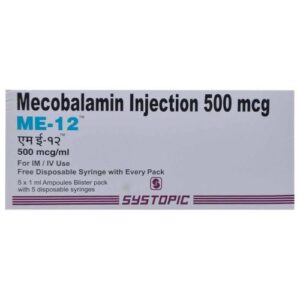MECOBALAMIN + PYRIDOXINE (VITAMIN B6) + FOLIC ACID
Mecobalamin: Mecobalamin, also known as methylcobalamin, is a form of vitamin B12. It is a naturally occurring compound that plays a crucial role in various bodily functions, including the formation of red blood cells, DNA synthesis, and the maintenance of the nervous system.
Mecobalamin is primarily used as a supplement to treat and prevent vitamin B12 deficiency. It is commonly prescribed for individuals with pernicious anemia, a condition where the body is unable to absorb vitamin B12 from food sources. It is also prescribed for individuals following certain surgical procedures or with certain gastrointestinal disorders that affect the absorption of vitamin B12.
The mechanism of action of Mecobalamin involves its conversion into an active form of vitamin B12 in the body. This active form then participates in various enzymatic reactions, including the conversion of homocysteine to methionine and the conversion of methylmalonyl CoA to succinyl CoA. By participating in these reactions, Mecobalamin helps maintain normal cellular function and supports nerve health.
The dose of Mecobalamin depends on the patient’s age, the severity of the deficiency, and the specific condition being treated. Typically, for adults with vitamin B12 deficiency, the recommended oral dose ranges from 1 to 2 mg per day. In some cases, injections may be prescribed for more severe deficiencies or when absorption through the digestive system is impaired.
Common side effects of Mecobalamin include headache, dizziness, nausea, vomiting, and diarrhea. These side effects are usually mild and temporary. In rare cases, individuals may experience an allergic reaction, which may include symptoms such as rash, itching, swelling, or difficulty breathing. If any serious or persistent side effects occur, it is important to seek medical attention.
It is worth noting that Mecobalamin is generally considered safe and well-tolerated when used as directed. However, it is important to consult with a healthcare professional before starting any new medication or supplement, as they can provide personalized guidance based on individual needs and medical history.
Pyridoxine (vitamin B6): Pyridoxine, also known as vitamin B6, is an essential water-soluble vitamin that plays a key role in various bodily functions. It is an important component of many enzymatic reactions involved in protein, carbohydrate, and lipid metabolism.
Pyridoxine is primarily used as a dietary supplement to treat or prevent vitamin B6 deficiency. It is also utilized in medical settings for the treatment of certain conditions such as pyridoxine-dependent epilepsy and excessive nausea and vomiting during pregnancy.
The mechanism of action of pyridoxine involves its conversion into its active form, pyridoxal-5-phosphate (PLP). PLP acts as a cofactor for numerous enzymes involved in amino acid metabolism, neurotransmitter synthesis, and the production of hemoglobin and red blood cells.
The recommended daily dose of pyridoxine varies depending on age, sex, and specific health conditions. For most adults, a daily intake of 1.3 to 1.7 mg is considered adequate. Higher doses may be prescribed by healthcare professionals for specific medical conditions.
Pyridoxine is generally well-tolerated when taken within recommended doses. However, excessive intake of vitamin B6 can lead to toxicity, resulting in symptoms such as numbness, tingling, and nerve damage in the extremities (peripheral neuropathy). Prolonged high doses can also cause sensitivity to sunlight, nausea, headache, and sleep disturbances.
It is important to note that while pyridoxine is beneficial for individuals who are deficient in vitamin B6, it is not recommended for use as a standalone treatment for other medical conditions unless directed by a healthcare professional. Always consult a healthcare provider prior to starting any new medication or supplement.
Folic Acid: Folic acid is a synthetic form of vitamin B9, which is essential for the production and maintenance of new cells in the body, including red blood cells. It is widely used as a dietary supplement and is also prescribed as a medication in certain medical conditions.
Folic acid is mainly used to treat or prevent folate deficiency, a condition that occurs when the body does not get enough vitamin B9 from the diet. It is particularly important for pregnant women to take folic acid supplements as it helps in the proper development of the baby’s brain and spinal cord. It is also used in the treatment of certain types of anemia, such as megaloblastic anemia, where the body does not produce enough healthy red blood cells.
The mechanism of action of folic acid involves its conversion into its active form, called tetrahydrofolate, in the body. Tetrahydrofolate is necessary for the synthesis of DNA, RNA, and certain amino acids, which are important for cell division and growth.
The recommended dose of folic acid varies depending on the condition being treated. For the prevention of neural tube defects during pregnancy, the usual dose is 400 to 800 micrograms (mcg) per day. In the treatment of anemia, the dose may range from 1 to 5 milligrams (mg) per day.
Folic acid is generally considered safe when taken at the recommended doses. However, like any medication, it can cause side effects. Some common side effects include nausea, abdominal cramps, diarrhea, and skin rash. In rare cases, high doses of folic acid can mask the symptoms of vitamin B12 deficiency, which may lead to nerve damage if left untreated. Therefore, it is important to use folic acid under the guidance of a healthcare professional.
It is worth noting that folic acid is not suitable for all individuals. People with pernicious anemia, a type of anemia caused by a lack of intrinsic factor needed for vitamin B12 absorption, should not take folic acid without also receiving vitamin B12 supplementation. Additionally, those with a history of allergic reactions to folic acid or folate should avoid its use.
Overall, folic acid is a valuable supplement and medication that plays a critical role in cell division and growth. It is widely used to prevent and treat folate deficiency and is particularly important for pregnant women to support the healthy development of their baby.


